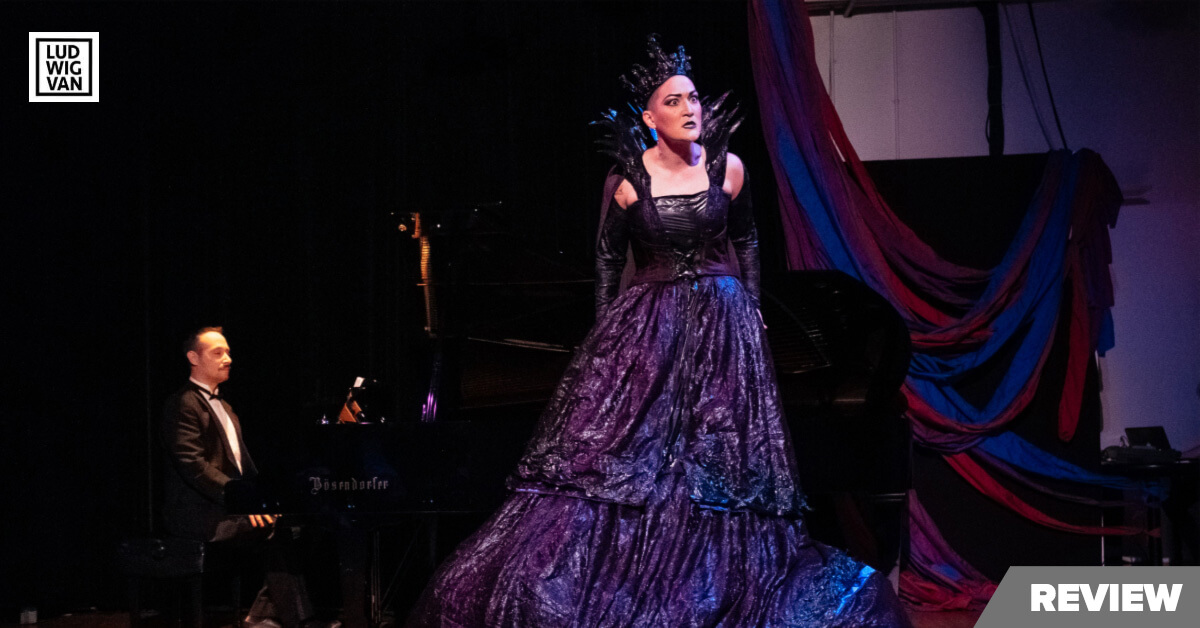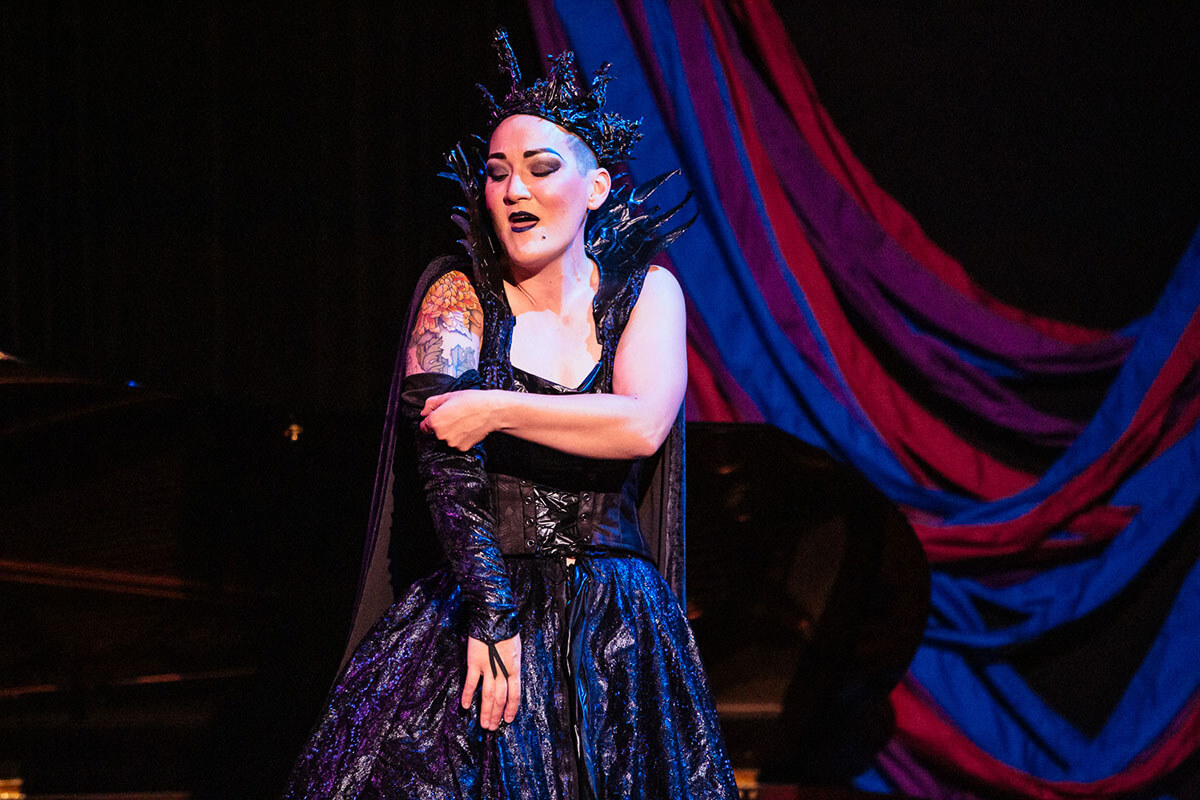
Over the Thanksgiving weekend, the two experimenters, Aria Umezawa and Teiya Kasahara, launched their new indie opera company: Amplified Opera (AO).
Currently, opera is the most expensive traditional classical music genre, and this massive expense come in tandem with a laden list: the sets, costumes, and several different zeitgeists, making it notoriously resistance to change. Nothing would appall a traditional opera head more than this single word: amplification — this is not musical theatre! So the launch of AO this weekend, consisting of three separate programs involving intimate pairing of a singer and pianist per program, is a clearly posed question: what is opera, now and here?
In this hour-long musical monologue, Teiya presents a mixed bag of opera ladies, but not the beautiful, weak, dying-of-tuberculosis, young and helpless ones. They present the problematic ones, the ones who speak a bit too loudly, who stand up to the rules, their hearts beating with their own ambitions: the Queen of the Night, Turandot, Lady Macbeth, Musetta and Salome, to name a few. These women are never active heroines of the plotline. They conflict with the male hero’s agendas (the need to marry, to become a king, and to possess a man rather than be possessed by men, etc.), and often are killed or rehabilitated.
“For 228 years, I have possessed body after body […] We keep appearing from the shadows on your stages, and while the sets are different and the costumes change, the stories keep killing, raping and pillaging us, not necessarily in that order. […] We can’t seem to uplift any woman, girl or soprano in any of these operas.”
Teiya’s imaginative spin on the untold stories of the Queen is a surprisingly common narrative, especially in the competitive performance art world. Too tall, too short. Too heavy, not sexy enough. Too plain, too distinctive. The everyday discrimination can become a real career breaker when you desperately need to be on the stage, and Teiya shoots straight lines from the collective experiences of women in opera, weaving in and out of different arias, with continuous support from pianist Trevor Chartrand.
“Every fallen woman comes from somewhere. Let me rephrase that because I never actually fell. I was pushed from your pretentious belief of what is good. So now we carry the name of the unruly woman…”
In the scene with Salome’s Dance of the Seven Veils, it becomes rather hard to tell who this character is anymore. The Queen sings, “You are too tall, you are too intense. Your Presence… Your voice is too big. You are simply too loud — she’s not wearing a mic! Have you tried contemporary music? Can she master the sexuality? … Maybe changing of repertoire or personality? At least you aren’t ethnic looking — but you are exotic, it’s a compliment!”
Of course, all pursuit of happiness is peppered with roadblocks, but Teiya’s observation from the other side of this ultra-serious discipline of opera, creates great punchlines, as they are truthful. Presented with these vignettes of women in opera, the house chuckled with familiarity.

It is a work-in-progress, and some might argue that this is not opera. However, if a sung dramatic text isn’t opera, what is opera?
Is it too close to musical theatre? Is it too raw? Is it not rich enough? The program has a nice story arc, and Teiya’s singing has technical and emotional riches to carry the music — even in just simple black garb, a long black dress — a full-length black dress hem is either for a temptress or a nun… and in this case, it was to be ripped off.
As the Queen stood tall in the middle of the stage, for the last full-run of aria, the Queen tore out of the black hem, into a bright white shirt and spoke her last words: “To the opera singers who will play me, strong and defiant, taking a stance, subverting the norm- the spell is broken… she’s here to let go of your rules and rigidities, of your broken promises, of her truth, her body, voice, all of her. She is not a problem. She’s a solution. She’s not rejecting the opera. She’s showing up to the party uninvited. She’s not done, she is not going to stop singing”
The next milestone for the Queen In me is scheduled for 2020, a world premiere of the completed version. It would be interesting to see how this brief show (an hour in length) will develop with the tertiary support of larger set and instrumental ensemble support.
Tonight was only one of Aria and Teiya’s 3-days curation, and it is ambitious to launch with three independent projects. But the heat is bright hot, and there are certainly more stories to tell, and to be told.
How many facets of the operatic world this little, unafraid company will amplify? So far, even just a single program provides enough curios to question and muse ‘what it could be,’ a presentation full of inflection and strong opinions. And we will be keeping an eye on the AO. Is Toronto ready for AO? Does Toronto want to support the contrarian, opinionated minority view?
#LUDWIGVAN
Want more updates on classical music and opera news and reviews? Follow us on Facebook, Instagram or Twitter for all the latest.
- CRITIC’S PICKS | Classical Music Events You Absolutely Need To See This Week: April 15 – April 21 - April 15, 2024
- SCRUTINY | Laurie Anderson Entrances A Sold-Out Koerner Hall With A Journey Down The Rabbit Hole - April 8, 2024
- CRITIC’S PICKS | Classical Music Events You Absolutely Need To See This Week: April 8 – April 14 - April 8, 2024



